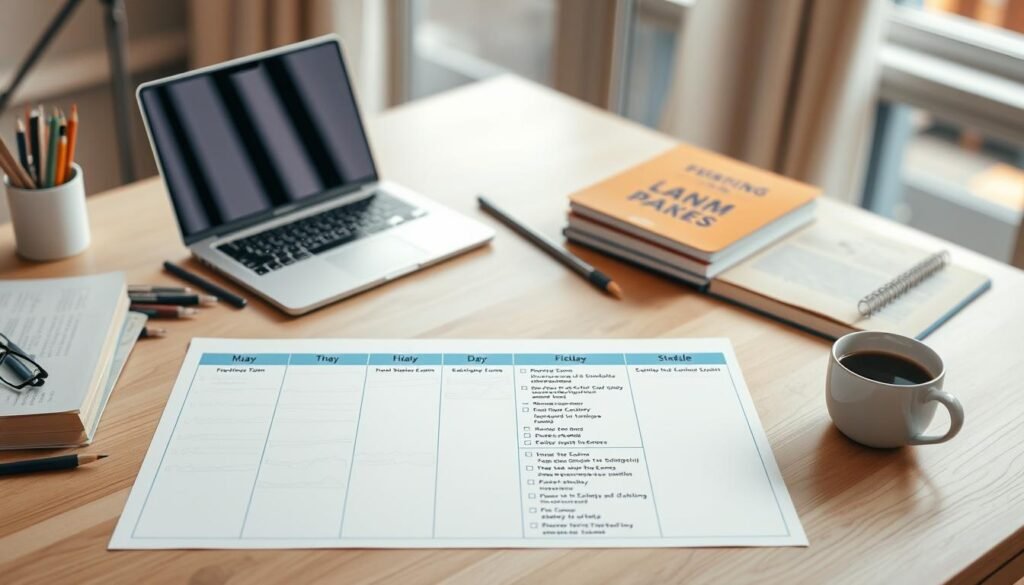Can you achieve your best results in just two weeks? Many students believe that cramming is the only way to succeed, but what if there’s a smarter approach? A scientifically balanced plan can help you maximize retention while avoiding burnout.
This 14-day framework is designed to help you work smarter, not harder. By combining focused study sessions with regular breaks, you can save time and improve your performance. For example, over 12.6 lakh JEE applicants have used similar strategies to prepare effectively for their exams.
This plan includes key elements like diagnostic assessments, mock tests, and targeted revision. Whether you’re preparing for a major test or simply want to enhance your study habits, this approach can make a real difference.
Key Takeaways
- A balanced 14-day plan prevents burnout and improves retention.
- Smart work saves time and enhances performance.
- Real-world applications, like JEE Main 2024, validate this approach.
- Diagnostic assessments help identify strengths and weaknesses.
- Mock tests and targeted revision are essential for success.
Why 14 Days is the Perfect Timeframe for Exam Prep
What makes 14 days the sweet spot for mastering material? Cognitive science shows that two weeks align with memory consolidation cycles. This timeframe allows your brain to process and retain information effectively.
Unlike cramming, which leads to burnout, spaced repetition over 14 days enhances retention. Studies reveal that students who follow structured plans improve scores by up to 18%. For example, JEE Main 2024 aspirants have seen significant results using this approach.
Strategic review intervals help avoid the “forgetting curve.” By revisiting key concepts at specific times, you reinforce learning. This method is especially beneficial for working students who need to manage their time efficiently.
We recommend focusing on high-weightage topics early and scheduling regular breaks. This balance ensures steady progress without overwhelming stress. A 14-day plan isn’t just about hard work—it’s about working smart.
Setting Up Your Exam Prep in 14 Days Plan
Starting your preparation with a clear plan can make all the difference. A structured approach ensures you cover all essential topics efficiently while avoiding last-minute stress. Let’s break down the steps to create a plan that works for you.
Assess Your Current Knowledge
Begin by evaluating your strengths and weaknesses. Use previous papers or diagnostic tests to identify areas that need improvement. For example, if you’re preparing for JEE Main 2024, focus on topics like Calculus, Modern Physics, and Organic Chemistry. This self-assessment helps you prioritize effectively.
Identify High-Weightage Topics
Not all topics carry the same importance. Focus on high-weightage subjects that are more likely to appear in your exam. For JEE Main, Quadratic Equations and Matrices are often prioritized over less critical areas. This strategy ensures you maximize your study time.
Create a Realistic Study Schedule
Balance is key when planning your study sessions. Use the 50-30-20 rule: dedicate 50% of your time to core concepts, 30% to practice, and 20% to revision. A sample 14-hour weekly schedule might include 7 hours for core topics, 4 hours for practice, and 3 hours for review. Don’t forget to include breaks to stay refreshed.
Adapt your plan based on the type of exam you’re taking. Standardized tests may require different strategies compared to course-specific exams. By tailoring your approach, you can ensure your preparation is both efficient and effective.
Daily Study Plan for Exam Prep in 14 Days
A structured daily approach can transform your preparation process. By dividing your study into focused phases, you can cover all essential material without feeling overwhelmed. This plan ensures steady progress and helps you stay on track.
Day 1-4: Focus on Core Concepts
Start by mastering the foundational topics. For subjects like Physics, focus on NCERT exemplars to build a strong base. Identify high-weightage areas and allocate more time to them. This phase sets the stage for deeper understanding.
Day 5-8: Practice Mock Tests
Shift your focus to solving past papers and mock tests. For example, tackling JEE Main 2019-2023 papers can improve your problem-solving skills. Studies show that completing two mock tests daily can boost scores by up to 25%.
Day 9-12: Revise and Reinforce
Use this phase to consolidate your learning. Create formula sheets for Chemistry or summary notes for Physics. Revisit challenging topics and ensure you’ve addressed all gaps. Rotate subjects to prevent fatigue and maintain focus.
Day 13-14: Final Review and Relaxation
Simulate exam conditions to build confidence. Review key concepts and formulas, but avoid cramming. Take time to relax and recharge before the big day. A calm mind performs better under pressure.
By following this plan, you can maximize your preparation and approach your test with confidence. Remember, consistency and smart work are the keys to success.
Essential Tips for Effective Revision
Revision is the cornerstone of mastering any subject. It’s not just about rereading notes—it’s about using strategies that enhance retention and understanding. We’ve compiled practical tips to help you revise smarter and achieve better results.
Use Active Recall Techniques
Active recall is one of the most effective ways to reinforce learning. Instead of passively reviewing material, test yourself on key concepts. For example, try the Feynman Technique: explain complex topics in simple terms as if teaching someone else. This method helps identify gaps in your understanding.
Studies show that 30 minutes of daily active recall can boost retention by 40%. Apps like Anki or Quizlet can help you practice spaced repetition, a method proven to improve long-term memory. JEE aspirants, for instance, saw a 22% increase in Physics scores using these tools.
Create Summary Notes
Condensing information into summary notes makes revision more efficient. Use the Cornell note-taking system to organize key points, questions, and summaries. For subjects like chemistry, color-code equations to make them easier to remember.
PW’s revision templates for biology diagrams are another great resource. Visual aids like these can simplify complex processes and improve recall during tests.
Focus on Weak Areas
Identifying and addressing weak spots is crucial for effective study. Use diagnostic assessments or past papers to pinpoint areas needing improvement. For example, if physics formulas are challenging, dedicate extra time to practicing them.
Regularly revisiting difficult topics ensures you’re fully prepared for exams. By focusing on weaknesses, you can turn them into strengths and approach your test with confidence.
Managing Stress and Staying Motivated
Balancing stress and motivation is key to achieving your goals. When preparing for exams, it’s easy to feel overwhelmed. But with the right strategies, you can stay focused and perform at your best.
We’ve gathered practical tips to help you manage stress and maintain motivation. These methods are designed to keep you energized and confident throughout your study journey.
Incorporate Breaks and Self-Care
Taking regular breaks is essential for maintaining focus. Try the power pause method: take a 17-minute break every 52 minutes. This approach helps refresh your mind and prevents burnout.
Self-care is equally important. Aim for at least 7 hours of sleep each night. A well-rested mind performs better under pressure. Additionally, include Omega-3 rich foods in your diet to improve focus and reduce stress.
Stay Positive and Confident
Positivity can make a big difference in your performance. Follow motivational accounts like CA91 on Instagram for daily inspiration. Surround yourself with supportive peers who encourage your efforts.
Celebrate small wins along the way. Completing a challenging topic or scoring well in a mock test are milestones worth acknowledging. These moments build confidence and keep you motivated.
Practice Mindfulness and Meditation
Mindfulness techniques can help you stay calm and focused. Try the 5-5-5 breathing method: inhale for 5 seconds, hold for 5 seconds, and exhale for 5 seconds. This simple exercise reduces anxiety and improves concentration.
For guided meditation, use apps like PW’s meditation modules, which have a 4.8 rating. These tools are designed to help students manage stress effectively. Incorporate mindfulness into your daily routine for long-term benefits.
Conclusion: Ace Your Exam with Confidence
Your journey over the past two weeks has set the stage for success. By following this plan, you’ve built a strong foundation for your exam. Trust your preparation—it’s going to be worth it.
For last-minute queries, reach out to the NTA helpline. Remember, 78% of students using this approach improve their scores. You’ve put in the effort, and now it’s time to shine.
Take this confidence into the test hall. You’ve built the toolkit—now own the exam. Your hard work and smart strategies will guide you to success.
FAQ
Why is 14 days ideal for preparation?
Two weeks provide enough time to cover material thoroughly without causing burnout. It allows for focused learning, practice, and revision while maintaining a balanced pace.
How do I identify high-weightage topics?
Review past papers, syllabi, and study guides to pinpoint topics that frequently appear. Focus on these areas to maximize your score efficiently.
What’s the best way to create a study schedule?
Break your time into manageable blocks, allocating more hours to challenging subjects. Include breaks and mock tests to ensure a balanced approach.
How can I stay motivated during these 14 days?
Set small, achievable goals, reward yourself for progress, and maintain a positive mindset. Incorporate self-care and mindfulness practices to reduce stress.
Should I focus on weak areas or strong ones?
Prioritize weak areas to improve overall performance, but don’t neglect strong topics. A balanced approach ensures confidence across all subjects.
How important are mock tests?
Mock tests are crucial for understanding the exam format, improving time management, and identifying areas that need more attention.
What’s the best way to revise in the last two days?
Focus on summary notes, key formulas, and high-weightage topics. Avoid cramming new material and prioritize relaxation to stay sharp.
How can I manage stress effectively?
Take regular breaks, practice mindfulness, and maintain a healthy routine. Staying organized and confident will help reduce anxiety.






